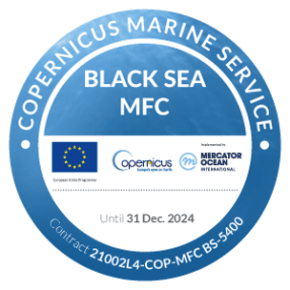Copernicus is the European Union’s Earth observation programme which offers information services that draw from satellite Earth Observation and in-situ (non-space) data and is managed by the European Commission. The Copernicus Marine Service provides regular and systematic reference information on the physical and biogeochemical state, variability and dynamics of the ocean and marine ecosystems for the global ocean and the European regional seas. It has been implemented by Mercator Ocean International (MOI) since 2015. It enables marine policy implementation, supports Blue Growth and scientific innovation. Copernicus Marine Service is an open and free of charge service, compliant with EU regulations such as INSPIRE and the Delegated Regulation on Copernicus data and information policy.
General objectives
This contract is issued within the Copernicus Marine Service phase of 2021 to 2027, for the provision of ocean analysis and forecasting products to be integrated into the Copernicus Marine Service. In particular the service will provide real-time and delayed-time physical, wave and biogeochemical products for the Black Sea.
The BS MFC is composed of three main components: BS-PHY, for the physical products; BS-BGC for the biogeochemical products and BS-WAV for the wave products.
The BS MFC Deputy Leader is Eric Jansen, from CMCC.
CMCC role
CMCC Foundation is responsible for: BS-PHY Production Unit and its Backup; hosting backup of BS-WAV Production Unit; BS-MFC Local Service Desk; implementing System Evolution tasks; co-coordination of the BS-MFC.
Activities
Main activities of the whole Black Sea service are grouped into:
- Data production and operations for near real time and multi-year products
- Service Desk
- Product Quality
- Systems Evolution and implementation
- Cross cutting activities: ocean state report (OSR) and ocean monitoring indicators (OMI), technical groups participation (coastal working group, technical working group, ensemble forecasting working group)
- Management and Reporting
Expected results
The Black Sea MFC provides:
- Analysis for the previous 2 years
- Forecast for the following 10 days
- Reanalysis for climate monitoring and ocean variability of ocean physical, biogeochemical and wave variables for the whole Black Sea according to the following preliminary schedule:
- 2022 release: timeseries starting from 1993 for BS-PHY and BS-BGC, from 1979 for BS-WAV;
- 2023 release: timeseries starting from 1993 for BS-BGC, 1950 for BS-PHY and BS-WAV;
- 2024 release: timeseries starting from 1950 for all BS-MFC components
- Interim timeseries for the reanalysis product from the previous 2 years up to present date
CMCC will contribute with new systems that will be able to provide high quality forecast and reanalysis for the Black Sea physical ocean state. The hydrodynamical core model, NEMO state-of-the-art, is online coupled to OceanVar for the assimilation of available observations in the basin (insitu temperature and salinity profiles, sea surface temperature and sea level anomaly satellite data), at the resolution of about 2.5 km and 121 vertical levels. The analysis and forecasting systems will progressively evolve to account for a) wave-currents coupling, b) inclusion of tides, c) inclusion of daily lateral open boundary conditions from the Unstructured Turkish Straits System developed at CMCC in collaboration with ITUNOVA and provisioning of forecast in the Marmara Sea, d) extended domain to include the Azov Sea and sea-ice, e) improvement of the river runoff representation by using state-of-the-art water discharges and the Estuarine Box Model for the Danube River, f) the production of new reanalysis to address the climate monitoring and ocean variability description, g) the upgrades of CMCC OceanVar scheme to accommodate assimilation of new observations and new parameterizations.
Partners
- Fondazione Centro Euro-Mediterraneo sui Cambiamenti Climatici – CMCC, Italy
- University of Liege – Uliege, Belgium
- Helmholtz-Zentrum hereon GmbH – Hereon, Germany
- Sofia University St. Kliment Ohridski – USOF, Germany
- National Institute of Hydrology and Water Management – NIHWM, Romania


